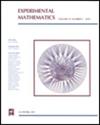Kac多项式的渐近性态
IF 0.9
4区 数学
Q2 MATHEMATICS
引用次数: 0
摘要
摘要我们猜想了一个由计算支持的公式,用于计算箭袋的Kac多项式,它只取决于每个顶点上的环的数量。我们证明了当增加箭头数量时,抖动的重整化Kac多项式的收敛性:它们以线性收敛速度收敛于幂级数的环中。然后,我们提出了一个关于Kac多项式系数的全局性态的猜想。所有计算均使用SageMath进行。本文章由计算机程序翻译,如有差异,请以英文原文为准。
Asymptotic Behavior of Kac Polynomials
Abstract We conjecture a formula supported by computations for the valuation of Kac polynomials of a quiver, which only depends on the number of loops at each vertex. We prove a convergence property of renormalized Kac polynomials of quivers when increasing the number of arrows: they converge in the ring of power series, with a linear rate of convergence. Then, we propose a conjecture concerning the global behavior of the coefficients of Kac polynomials. All computations were made using SageMath.
求助全文
通过发布文献求助,成功后即可免费获取论文全文。
去求助
来源期刊

Experimental Mathematics
数学-数学
CiteScore
1.70
自引率
0.00%
发文量
23
审稿时长
>12 weeks
期刊介绍:
Experimental Mathematics publishes original papers featuring formal results inspired by experimentation, conjectures suggested by experiments, and data supporting significant hypotheses.
Experiment has always been, and increasingly is, an important method of mathematical discovery. (Gauss declared that his way of arriving at mathematical truths was "through systematic experimentation.") Yet this tends to be concealed by the tradition of presenting only elegant, fully developed, and rigorous results.
Experimental Mathematics was founded in the belief that theory and experiment feed on each other, and that the mathematical community stands to benefit from a more complete exposure to the experimental process. The early sharing of insights increases the possibility that they will lead to theorems: An interesting conjecture is often formulated by a researcher who lacks the techniques to formalize a proof, while those who have the techniques at their fingertips have been looking elsewhere. Even when the person who had the initial insight goes on to find a proof, a discussion of the heuristic process can be of help, or at least of interest, to other researchers. There is value not only in the discovery itself, but also in the road that leads to it.
 求助内容:
求助内容: 应助结果提醒方式:
应助结果提醒方式:


